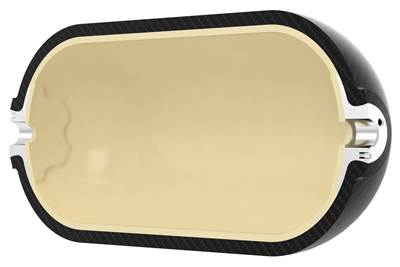NCC launches U.K. initiative to industrialize continuous carbon fiber reclamation
The NCC begins a three-year program to rapidly refine and scale industry continuous carbon fiber recycling, a key solution to net-zero ambitions. Partner collaborations are welcomed to the effort.
Reclaimed continuous carbon fiber. Photo Credit: NCC
On Sept. 7, the (NCC, Bristol, U.K.) launched an initiative to industrialize continuous carbon fiber reclamation in the U.K. The three-year innovation program will see a team of composites specialists refine and scale the industrial processes needed to establish a commercial market for reclaimed continuous carbon fiber. With global demand for virgin fiber set to exceed supply by 2025, the NCC believes this could ease pressure on supply chains and see the U.K. take a leading role in defining a new era for composites.
While chopped carbon fiber is already recycled, industrial applications for the material tend to be narrow. Working with B&M Longworth (Edgworth, U.K.) and Cygnet Texkimp (Northwich, Cheshire, U.K.), the NCC successfully trialed and tested processes to reclaim and reuse “continuous” lengths of carbon fiber that retain a higher material performance in May 2022. It is hoped that this will accelerate the creation of three different grades of carbon fiber — “A, B and C” — to support a wider range of applications and reduce the volume of continuous carbon fiber-reinforced polymer (CFRP) material sent to landfills in the U.K. by 50% by 2026.
With lightweight, strong and design-friendly carbon fiber being a key component in everything from aircraft and electric vehicles (EVs), to hydrogen storage tanks and the next generation of super-sized turbine blades, global demand for the material is set to outstrip supply — growing from nearly 100,000 metric tons to around 300,000 metric tons by 2030, the NCC reports. This shortage will have an impact on many sectors striving to achieve net-zero goals.
One of these is the sporting goods market (see “Athletic shoe developed with repurposed thermoplastic waste” and “Flexible carbon fiber plates enable high-performance footwear” for examples). Recycled carbon fiber could help makers of trainers, fishing rods, tennis racquets and bicycles substantially reduce the levels of “embodied carbon” in their products — the amount of primary energy used, or carbon released, from the direct and indirect processes associated with manufacturing.
The team has developed a challenging route map to industrialization, with the first sprint project expected to finalize in November 2022.
The average running shoe currently has a carbon footprint of approximately carbon dioxide emissions (CO2e), and manufacturing cars creates between 6,000 and 35,000 kilograms of CO2e per vehicle from basic to . Through trials, the NCC has calculated that using reclaimed carbon fiber reduces material manufacturing emissions from around 29.5 kilograms CO2e per kilogram to 5 kilograms CO2e.
The development of a “second-life” supply chain may also help businesses remain profitable, the NCC says: With supplies of the highest quality virgin fiber likely to be claimed by aerospace and defense, sporting goods firms will need an alternative material to turn to.
“The U.K. leads the world in the industrialization of carbon fiber manufacturing but has struggled to develop the sector,” Enrique Garcia, chief technology officer (CTO) at the NCC, says. “We exported much of our expertise— and even our manufacturing infrastructure — to Japan, which was subsequently able to capitalize on a huge growth in U.S. defense spending in the 1980s and, later, a boom in consumer demand for high-end carbon fiber products. We now have a unique opportunity to drive forward a new market by industrializing the processes required to recycle carbon fiber — it is imperative that we push hard now to establish this capability in the U.K.”
According to Garcia, the NCC is looking to rapidly scale up this collaboration and seek partners who would be interested in accelerating product demonstrators using reclaimed continuous fiber in order to reduce their manufacturing carbon footprint.
The team has developed a challenging route map to industrialization, with the first sprint project expected to finalize in November 2022.
To find out how reclaimed continuous carbon fiber can benefit your business, the NCC suggests emailing lowcarbon@nccuk.com to book a free consultation.
Related Content
Cutting 100 pounds, certification time for the X-59 nose cone
Swift Engineering used HyperX software to remove 100 pounds from 38-foot graphite/epoxy cored nose cone for X-59 supersonic aircraft.
Read MoreWelding is not bonding
Discussion of the issues in our understanding of thermoplastic composite welded structures and certification of the latest materials and welding technologies for future airframes.
Read MoreRevisiting the OceanGate Titan disaster
A year has passed since the tragic loss of the Titan submersible that claimed the lives of five people. What lessons have been learned from the disaster?
Read MoreOtto Aviation launches Phantom 3500 business jet with all-composite airframe from Leonardo
Promising 60% less fuel burn and 90% less emissions using SAF, the super-laminar flow design with windowless fuselage will be built using RTM in Florida facility with certification slated for 2030.
Read MoreRead Next
NCC digital design trial speeds up composite pressure vessel proof of concept
Application of multi-disciplinary optimization (MDO) techniques determines optimal composite hydrogen pressure vessel design five times faster, says the NCC.
Read MoreCeramic matrix composites: Faster, cheaper, higher temperature
New players proliferate, increasing CMC materials and manufacturing capacity, novel processes and automation to meet demand for higher part volumes and performance.
Read MoreScaling up, optimizing the flax fiber composite camper
Greenlander’s Sherpa RV cab, which is largely constructed from flax fiber/bio-epoxy sandwich panels, nears commercial production readiness and next-generation scale-up.
Read More












